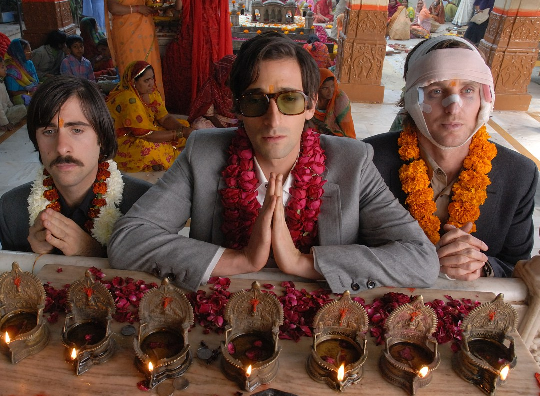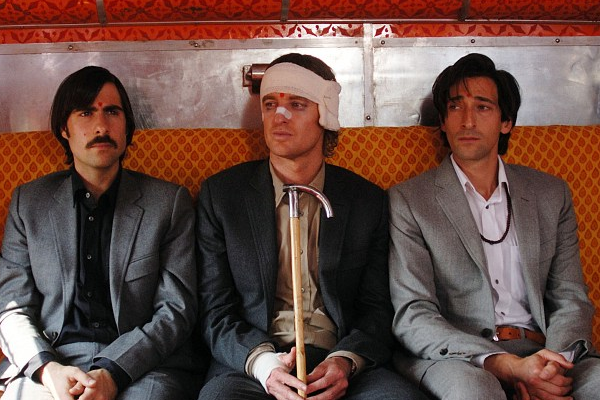Before seeing “The Darjeeling Limited”, you have advised audiences to watch “Hotel Chevalier”, a short film which introduces the character Jason Schwartzman plays in “Darjeeling”. Was it planned all along to make a short first and then a feature?
“No, it wasn’t. The two sort of came about at the same time. I started writing the feature and then I wrote the short, and then Jason, Roman Coppola and I got together and continued writing the feature. So the two sort of grew separately but simultaneously, and they’re gonna be shown in various different ways.”
You actually went to India with Roman and Jason while you were writing the film, right?
“That’s right, we went on a train journey around India, we travelled, we stayed in the desert for a period of time and we wrote there, we went into the mountains and we wrote there, too.”
Did some of the crazy things that happen in the film happen to you guys too?
“Well, we tried to make the movie as personal as we could, so we always tried to use our own experiences and share our experiences with each other, and then try to use our imagination to make them into a story, which is fictional, but there’s always a link to our own stories, I think.”
I heard that the three main characters (who are called Jack, Francis and Peter) are inspired from Jack Nicholson, Francis Ford Coppola and Peter Bogdanovitch. Is there any truth to that?
“No, no. We used Francis’ name and we also used the name of Jason’s father, Jack Schwartzman. The characters are drawn from all kinds of different sources, but they’re ultimately invented characters.”
One of the best things in the film is the dynamic between those three brothers. Do you have brothers yourself?
“Yes, I have an older brother and a younger brother.”
Was that the first thing you wanted to make this movie about, or was it India, or the train?
“Well, I don’t remember which was first, but it was those three things: brothers, India, train. I had all those things in mind. And then it was really when I started to write with Roman and Jason that the real process began, because the story we ended up telling was invented by the three of us together. The other thing was, this movie by John Cassavetes, Husbands. That was an inspiration that we had in mind from the very beginning and that was something we all felt we could relate to.”
Did Indian cinema inspire you at all?
“Very much. The films of Satyajit Ray were part of what inspired me to wanna make movies in the first place, and then they certainly inspired me to wanna go to India. And then also, Louis Malle’s documentaries about India and Jean Renoir’s movie The River were an inspiration to me. And with Satyajit Ray, he composed the music to many of his movies himself, and we use a lot of his music in our film.”

I’m a big fan of Bollywood and while your film is obviously not a Bollywood film per se, it does share with it a way of using vibrant colors, a tendency to hop casually between comedy, drama and action, the thematic importance of family…
“Hmm. I think that, with the colors in particular, that’s really about the place. We went to India to see what we could discover, not to see what we could invent. We had our story that we invented, but the visuals of the movie are all based on what we found there, what surprised us there and what we learned as foreigners there.”
What about the fact that most of the film takes place in a train? One of the most characteristic things about your movies is the wonderful widescreen composition, but here you’re often in this narrow environment.
“I think that the widescreen frame is very good for photographing actors. In particular, if you have three actors, you can get very close to three people at once when you have a frame that’s that wide. So we tried to take advantage of that.”
India almost becomes another character in the film. Is that something you intentionally tried to achieve?
“I think with this movie, India is not so much the backdrop as it is the subject matter of the movie. And that happened very naturally because it’s such a complex place, and for a foreigner, it’s filled with mystery. It’s a place where there are so many things that on the outside you don’t understand, and you learn so much so quickly while you’re there, and there’s so much more to learn about it, there’s so much religion, such depths to their culture, such antiquity and so many people that it’s overwhelming and, otherwise, tremendously inspiring.”
It’s my favourite of your movies in great part, I think, because India is such a fascinating place.
“Oh, I’m glad. Have you ever been to India?”
No, I’ve only seen it in lots of films!
“Well, that’s the way I got interested in India, it was through films, too. I felt that the movies that I’ve seen that were set in India or made by Indian filmmakers, when I went to India, I felt familiar with the place, because they really had shown me a lot. Although then you just see how much more there is beyond that.”
To go back to your movies in general, I feel that out of all the filmmakers of your generation, you might have the most unique style. You see one frame of one of your films and you can tell it’s Wes Anderson. How did you develop such a particular style?
“That may just be, very simply, my own point of view. I feel like, if that’s the case, and people see my movies and say that they have a lot of similarities to each other, and can see the connection, I don’t mind that, I don’t mind that my movies follow a train of thought. That’s not something I feel the desire to resist, I’m comfortable with that.”
Oh, it’s a great thing. It’s better than if people looked at your films and said, that looks like Scorsese.
“Right!”

How did you choose these three actors, who are great, but you wouldn’t think of them as brothers.
“No, you wouldn’t. I think Jason and Adrien, these two would be more likely to be brothers, but Owen is so different from them. In fact, it’s just because we were all friends, Jason, Owen and I, and we wanted to work together. And Adrien is somebody who I’ve wanted to work with for a long time. So no, they don’t seem like they would be likely to be brothers at all, but they all just sort of clicked. They’re good actors, and they know how to do that.”
Another thing I love in your movies is the use of music. Here, I was particularly surprised to hear a Joe Dassin song, who’s a legend here in Quebec (and in France of course), but you rarely hear French music in American films.
“Well, there’s a French connection that goes on in this movie. We wrote a lot of it in Paris, before going to write in India, and we made the short in Paris. It ends up being connected to France as well as India.”
There’s a lot of British music as well, with the Rolling Stones and The Kinks, but nothing American. Is that because you have a more European sensibility?
“I wouldn’t think so, because I come from Texas and my point of view is shaped a lot by that place, and by New York, too. But certainly I have lots of influence from Europe.”
“The Darjeeling Limited” will be released in Montreal on October 12th.
